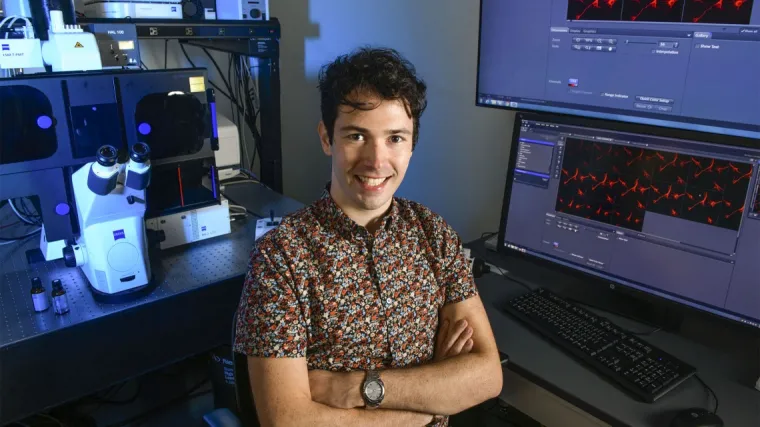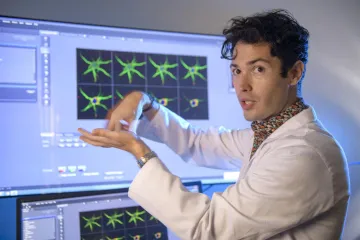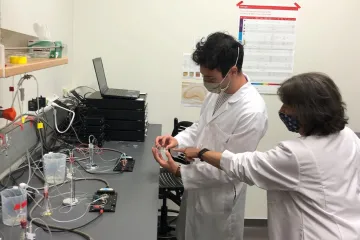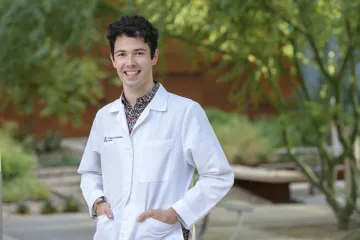Guest Column: Student Inspired by Alzheimer’s Research
Greg Branigan is a first-generation MD/PhD student driven by research linking a breast cancer drug with Alzheimer’s prevention.

Greg Branigan, a fourth-year MD/PhD student in the College of Medicine – Tucson, conducts research at the Center for Innovation in Brain Science (CIBS). He is part of a team that recently published a study showing certain breast cancer treatments also can reduce the risk of age-related Alzheimer’s disease.
Kris Hanning

My grandmother is suffering from Alzheimer's disease. I would be lying if I said that isn't one of the big reasons why I’m so excited by this type of research. Having been personally affected by this horrible disease, I am grateful to work on research that can actually be impactful, both to develop treatments and to prevent this from happening to others.
When I joined the research project at CIBS, in the lab of Director Roberta Brinton, PhD, we embarked on a study that looked at patient records of women who are diagnosed with breast cancer to see whether there were treatment modalities that would alter their risk for developing age-related Alzheimer's disease. The most significant findings from this study were that there are certain therapeutics, such as tamoxifen and steroidal aromatase inhibitors that, when used for the treatment of breast cancer, are reducing the risk and the development of Alzheimer’s later in life for these women.
This project embodies a lot of what I hope to do for the rest of my career. I’m working toward an MD and a PhD because I want to facilitate an open conversation between the clinic and the research laboratory. That’s what this project is all about.
Breast cancer treatment drugs are notoriously complicated, and no one has looked at what these therapies are doing to the brain. It was exciting to be one of the first people to ask these questions. We know what's happening in the breast, and how these drugs affect other tissues in the body. But, what about the brain?

In this study, it was crucial to use clinical observation to generate specific observations that we can take back to the lab to investigate. We now have the opportunity to get a basic science understanding of how these therapies affect brain health that can eventually inform the conversations between patients and doctors and ultimately improve our treatment regimens.
When we are treating a disorder or disease, we usually treat it in a very systemic way. The takeaway for us here is that when there are therapies used to treat one disease, it is important to understand how these therapies are affecting the entire body. We need to understand the risks, and the relationship with other systemic effects in places like the brain when we use long-term targeted therapies – especially in aging, at-risk populations.
This was just the first round of findings from this study. A lot of the work that we hope to be publishing in the next few years will examine the benefits of moving toward collaborative science and precision medicine that targets an individual's health to better prevent Alzheimer's and other neurodegenerative diseases and promote healthy brain aging.
Together we know more
The support that I’ve had from mentors helped me develop as a scientist and a physician, to foster a curiosity to continue asking questions and to come up with ways to answer those questions. I learned in the last year that I'm definitely happiest and most productive when I'm working as part of a team.

Something that my mentor Dr. Brinton likes to say is that no one person knows it all, but together we know a lot. The opportunity to work with other brilliant scientists including data scientists, wet lab molecular biologists, and the clinicians and regulatory scientists who work in our clinical trials to name a few, offers an immense and very wide breadth of training. Those interactions and personal connections are what keep me excited to come to work each day.
The mentors on my path have been so wonderful to help me reach goals and give me the resources and opportunities necessary to be impactful and to develop in this research space. I am incredibly grateful that there has been support for me to take on the scientific ground as a first-generation college student. It has been such a tremendous force in my life.
The next chapter
My goal is to be an academic neurologist who will be working in the clinic, potentially treating patients with Alzheimer’s disease, while having a lab that will work on drug development and understanding these mechanistic questions that we develop in the clinic, as well as training the next generation of MD/PhD students.
I think neurology in general is so exciting because there are so many open questions. The field is welcoming to those of us who are interested in these dual degree training opportunities that allow me to have a foot in the clinic and a foot in the lab. I think it really is, if I can be so bold to say, one of the final frontiers in medicine. We have a lot worked out in our understanding of various diseases and in neurology itself, but there's still a lot of work to be done.

